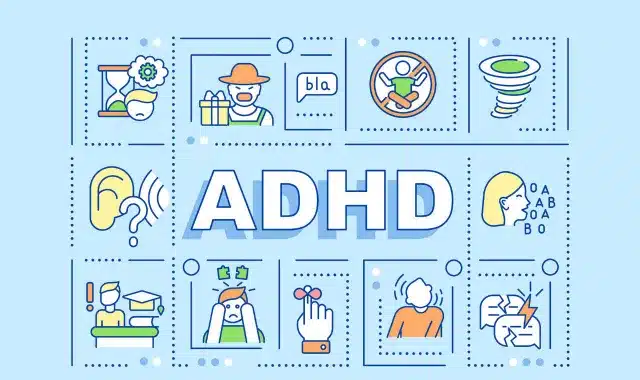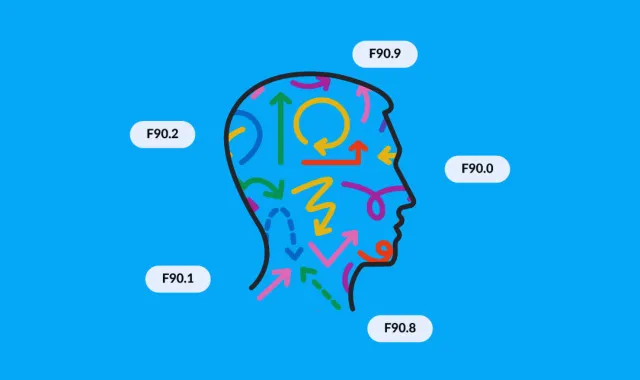Attention Deficit Hyperactivity Disorder (ADHD) is a common neurodevelopmental condition affecting children and adults across the world. To standardize diagnosis, treatment, and research, the World Health Organization (WHO) included ADHD in the International Classification of Diseases, 10th Revision (ICD-10).
The ADHD ICD-10 coding system ensures doctors, researchers, and insurers follow a global standard when classifying ADHD symptoms and types.
About adhd icd 10
ADHD ICD-10is classified under code F90—Hyperkinetic Disorders in the World Health Organization’s diagnostic system. It standardizes the diagnosis of attention deficit hyperactivity disorder worldwide, covering symptoms like inattention, hyperactivity, and impulsivity. This coding ensures accurate medical records, insurance claims, and research consistency, supporting better treatment and global healthcare understanding of ADHD.
Adhd icd 10 Codes and Classifications
The ICD-10 places ADHD under the category of F90 – Hyperkinetic Disorders. This category is used internationally by healthcare providers to record ADHD cases in a uniform way. The classification helps medical professionals identify subtypes of ADHD and record them correctly in medical systems.
| ICD-10 Code | Category | Description |
| F90.0 | Disturbance of Activity and Attention | The standard ADHD diagnosis with combined symptoms of inattention, hyperactivity, and impulsivity |
| F90.1 | Hyperkinetic Conduct Disorder | ADHD symptoms combined with conduct disorder, often showing aggression or defiance |
| F90.8 | Other Hyperkinetic Disorders | ADHD variants that don’t fully meet the criteria of other categories |
| F90.9 | Hyperkinetic Disorder, Unspecified | ADHD-like symptoms present, but insufficient detail for a precise code |
What is adhd?

ADHD is a brain-based disorder marked by patterns of inattention, hyperactivity, and impulsivity. While everyone may occasionally struggle with focus or restlessness, ADHD is diagnosed when these symptoms are persistent, severe, and interfere with daily functioning.
Children with ADHD may face challenges in school, while adults may experience difficulties in managing work and relationships. ICD-10 provides a clear diagnostic framework, ensuring that ADHD is recognized as a medical condition rather than misinterpreted as poor behavior or lack of discipline.
Adhd icd 10 Diagnosis Criteria
For a diagnosis under ICD-10, Adhd icd 10 must meet specific conditions:
- Early Onset: Symptoms must appear before the age of 7.
- Duration: Symptoms should persist for at least 6 months.
- Multiple Settings: Difficulties must be observed across different situations, such as school, home, or workplace.
- Impairment: Symptoms must negatively affect learning, social interactions, or occupational performance.
- Exclusion: The condition must not be better explained by other disorders like autism, anxiety, or mood disorders.
Healthcare professionals use structured assessments, interviews, and behavioral checklists to confirm the diagnosis.
Symptoms of adhd according to icd 10
ADHD symptoms are divided into three main clusters. A child or adult may show symptoms from one or more clusters:
Inattentive Symptoms
- Frequent careless mistakes in school or work
- Difficulty maintaining attention in activities
- Disorganization and forgetfulness
- Avoiding tasks requiring long mental effort
- Losing important items frequently
Hyperactive Symptoms
- Constant fidgeting and tapping
- Leaving the seat when expected to stay seated
- Talking excessively or noisily
- Running or climbing in inappropriate situations
- Difficulty staying still during calm activities
Impulsive Symptoms
- Blurting out answers before a question is complete
- Interrupting others’ conversations or games
- Acting without thinking about consequences
- Trouble waiting for their turn
- Impatience and emotional outbursts
Adhd icd 10 vs dsm 5
Adhd icd 10 can be diagnosed using both ICD-10 and DSM-5, but there are differences:
- ICD-10: Refers to ADHD as a hyperkinetic disorder. It requires all three symptoms (inattention, hyperactivity, and impulsivity) to be present.
DSM-5: Refers to ADHD simply as ADHD. It allows for subtypes such as predominantly inattentive, predominantly hyperactive-impulsive, or combined presentation. - ICD-10 is stricter, often resulting in fewer diagnoses compared to DSM-5.
This difference means some individuals who qualify for an ADHD diagnosis under DSM-5 may not meet ICD-10 criteria.
Importance of Medical Coding in adhd
Medical coding is critical for multiple reasons:
- Insurance Claims: Correct coding ensures that treatment is covered by insurance companies.
- Research: Coding creates uniformity, allowing researchers worldwide to compare Adhd icd 10 prevalence and treatment outcomes.
- Treatment Planning: Accurate classification helps doctors decide on targeted interventions.
- Medical Records: Coding ensures clear documentation for future treatment.
For instance, a patient diagnosed with ADHD and aggressive behavior may be coded under F90.1 Hyperkinetic Conduct Disorder, ensuring their record reflects both ADHD and conduct issues.
Adhd Management and Treatment Under icd 10

Although ICD-10 provides classification, treatment is tailored to individual needs. Common treatment options include:
Medications
- Stimulants: Methylphenidate and amphetamines are commonly prescribed.
- Non-stimulants: Atomoxetine and certain antidepressants are alternatives when stimulants are not suitable.
Behavioral Therapy
- Parent management training
- Social skills training
- Cognitive Behavioral Therapy (CBT)
Supportive Strategies
- Regular routines and structure
- Positive reinforcement systems
- Physical activity to reduce hyperactivity
- Academic support programs
Challenges in adhd icd 10 Diagnosis
Despite global recognition, Adhd icd 10 diagnosis faces challenges:
- Gender bias: Girls often show inattentive symptoms, leading to underdiagnosis.
- Cultural stigma: In some countries, Adhd icd 10 is misunderstood, causing delays in seeking help.
- Overlap with other conditions: Symptoms may resemble anxiety, autism, or learning disabilities.
- Transition to ICD-11: The newer ICD-11 framework has updated ADHD criteria, which may differ from ICD-10.
FAQs about adhd icd 10
Q1. What is the main ADHD ICD-10code?
A.w: The main ADHD ICD-10code is F90.0—Disturbance of Activity and Attention, which covers the core symptoms of inattention, hyperactivity, and impulsivity.
Q2. How is ADHD diagnosed under ICD-10?
A.w: Adhd icd 10 is diagnosed if symptoms begin before age 7, last for at least 6 months, appear in multiple settings, and cause significant impairment. Doctors use interviews, observation, and structured assessments for confirmation.
Q3. Is ADHD under ICD-10recognized worldwide?
A.W: Yes, ICD-10 is the international standard classification by the World Health Organization (WHO). Countries across the globe use it for coding, research, and healthcare records.
Q4. How is ICD-10different from DSM-5 for ADHD?
A.w: ICD-10 requires all three symptoms (inattention, hyperactivity, and impulsivity) to be present together, while DSM-5 allows different ADHD subtypes, making DSM-5 more flexible in diagnosis.
Q5. Does ADHD treatment depend on ICD-10coding?
A.W.: While ICD-10 classification ensures accurate documentation, treatment depends on individual needs. Doctors may recommend medications, behavioral therapies, or lifestyle changes, regardless of the exact ICD-10 code.
Final Thoughts

The ADHD ICD-10coding system is a crucial tool for ensuring accurate diagnosis, medical coding, and treatment across the globe. By classifying ADHD under F90 Hyperkinetic Disorders, ICD-10 provides a standardized way for doctors, insurers, and researchers to record and address ADHD.
Though ICD-10 has stricter criteria compared to DSM-5, its consistency helps improve global research, insurance processing, and clinical care. With ICD-11 now being adopted, the groundwork laid by ICD-10 continues to influence ADHD diagnosis and management, helping millions receive proper recognition and care.
